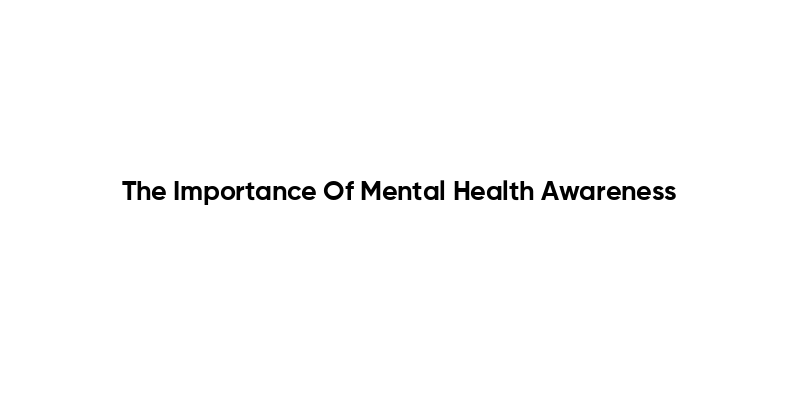Mental health awareness is a crucial aspect of overall well-being that often goes overlooked in our fast-paced society. Understanding the importance of mental health awareness not only helps individuals recognize their own mental health needs but also fosters a supportive environment for those around them. By raising awareness about mental health issues, we can break the stigma associated with mental illness and encourage open conversations that lead to healing and understanding. This article delves into the significance of mental health awareness and its role in promoting a healthier society.
In the following sections, we will explore various dimensions of mental health awareness, including its impact on personal relationships, workplace productivity, and community health. You will learn about the signs and symptoms of mental health disorders, the importance of seeking help, and effective strategies for promoting mental well-being. Additionally, we will discuss how education and advocacy can empower individuals to take charge of their mental health and support others in their journey.
As you continue reading, you will discover practical tips for fostering mental health awareness in your community and the vital role that each of us plays in creating a culture of understanding and support. Whether you are seeking to improve your own mental health or help someone else, this article aims to equip you with the knowledge and tools necessary to make a positive impact. Join us in this important conversation and take the first step towards a more aware and compassionate society.
Understanding Mental Health
Mental health encompasses our emotional, psychological, and social well-being. It affects how we think, feel, and act, and it plays a crucial role in how we handle stress, relate to others, and make choices. Understanding mental health is essential for recognizing the signs of mental illness and the importance of seeking help. Mental health issues can affect anyone, regardless of age, gender, or background, making awareness vital for fostering a supportive community.
By promoting mental health awareness, we can help reduce the stigma associated with mental illness. This stigma often prevents individuals from seeking the help they need, leading to worsening conditions. Education about mental health can empower individuals to take charge of their well-being and encourage open conversations about mental health challenges.
The Impact of Mental Health on Daily Life
Mental health significantly impacts various aspects of daily life, including relationships, work performance, and overall quality of life. Individuals struggling with mental health issues may experience difficulties in maintaining personal relationships, leading to feelings of isolation and loneliness. Furthermore, mental health can affect productivity and job satisfaction, as those dealing with anxiety or depression may find it challenging to concentrate or engage fully in their work.
Recognizing the impact of mental health on daily life is crucial for both individuals and organizations. Workplaces that prioritize mental health awareness can create supportive environments that enhance employee well-being and productivity. Implementing mental health programs and resources can lead to a healthier workforce and a more positive workplace culture.
Signs and Symptoms of Mental Health Issues
Identifying the signs and symptoms of mental health issues is a critical step in promoting awareness. Common symptoms may include persistent sadness, changes in appetite or sleep patterns, withdrawal from social activities, and difficulty concentrating. Understanding these signs can help individuals recognize when they or someone they know may need support.
Awareness of mental health symptoms can also facilitate early intervention, which is essential for effective treatment. By educating the public about these signs, we can encourage individuals to seek help sooner, potentially preventing more severe mental health crises. Community programs and resources can play a vital role in providing information and support for those in need.
The Role of Education in Mental Health Awareness
Education is a powerful tool in promoting mental health awareness. Schools, workplaces, and community organizations can implement educational programs that focus on mental health literacy. These programs can teach individuals about the importance of mental health, coping strategies, and available resources for support.
By integrating mental health education into curricula and training, we can foster a culture of understanding and empathy. This proactive approach can help reduce stigma and encourage individuals to seek help when needed. Additionally, mental health education can empower individuals to support their peers, creating a more compassionate and informed community.
Resources for Mental Health Support
Access to mental health resources is essential for promoting awareness and providing support. Various organizations, hotlines, and online platforms offer valuable information and assistance for individuals facing mental health challenges. These resources can include therapy options, support groups, and educational materials that help individuals understand their mental health better.
Creating a comprehensive list of mental health resources can serve as a valuable tool for those seeking help. By making this information readily available, we can encourage individuals to take the first step toward improving their mental health. Community outreach programs can also play a significant role in connecting individuals with the resources they need.

